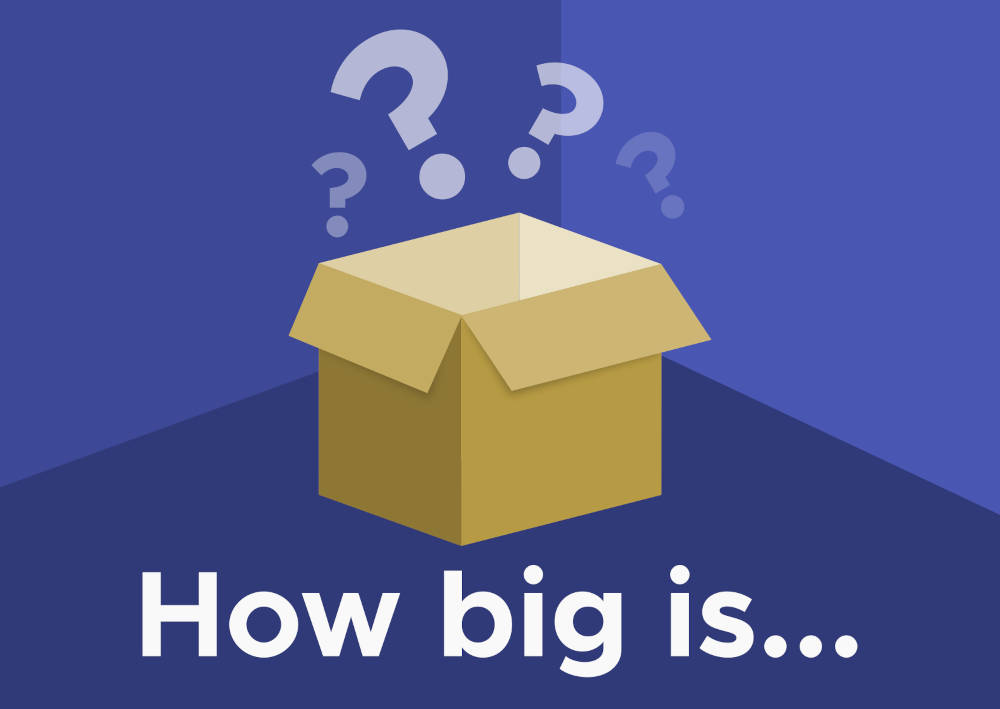How big is 1 Petabyte (PB)? Is It Enough For You?



Just how much storage is 1PB? For you nerds out there, 1PB is 1,000,000,000,000,000 bytes. But, if those numbers don't mean anything to you, you're not alone!
Even if you know your bits and bytes, numbers alone won't help you understand how much you'll get out of 1PB. Let's go over a few practical ways you can think of 1PB. So you'll know if 1PB is enough for you.
How much content fits in 1PB?
Is 1PB a lot? Even if you know how many petabytes you have, it won't make sense unless you have a good analogy for it. Think of 1PB as:
1PB is 1,000,000,000 high quality photos
Assuming photos are around 1MB each
1PB is 81.539 years of video
Assuming each hour of video is around 1.4GB
1PB is 333,333,333 songs
Assuming each song is around 3 minutes long, and each minute is 1MB
1PB is 87.812 years scrolling through tiktok
Assuming each video is around 13MB and you watch around 100 tiktoks per hour
1PB is 384,615,384 ebooks
Assuming each ebook is 2.6MB
1PB is 1,902.588 years of music
Assuming one minute of music is 1MB
1PB is 1,426.941 years playing video games
Assuming one hour of gaming uses 80MB
Is 1PB Enough for You?
If you're wondering if 1 Petabyte is enough for you, you'll first have to answer: is this for storage (e.g. laptop, flash drive) or for data transfer (e.g. cell phone plan or internet service)?
If it is for storage, try to estimate the number of photos and videos you need to store and compare with the section above to see if 1PB is enough for you.
Otherwise, if it is for data transfer, try to estimate the number of hours of streaming and social media you'll use and compare with the section above to see if 1PB is enough for you.
What are other ways to say 1 Petabyte?
- 1 Petabyte (PB) to 8000 Terabits is 8000 Terabits
- 1 Petabyte (PB) to 1000 Terabytes (TB) is 1000 Terabytes
- 1 Petabyte (PB) to 8 Petabits is 8 Petabits
Is 1 Petabyte the same as 1 Petabit? (1 Petabyte vs 1 Petabit)
No, 1 Petabyte is not the same as 1 Petabit!
When internet service providers talk about data usage, they refer to the amount in terms of bits rather than bytes. For example, a typical download speed from a internet provider is often advertised as 200 megabits per second (abbreviated as "Mb" with a lower case "b").
When talking about storage on your phone or computer, people almost always refer to bytes rather than bits. You'll hear about the iPhone having 128 gigabytes (abbreviated as "GB" with a capital "B"). You'll almost never hear that the iPhone has 1024 gigabits of storage (which is the equivalent to 128GB in gigabits).
The difference between bytes and bits is important so you know exactly how much data or storage you're getting. 1 Petabyte is eight times more than 1 Petabit!
Looking for Some Other Size? Type in Any Size Below
Type in any size into the search bar below, and then click "Go". Here are some example sizes you could try out:
What are some common storage and data transfer sizes?
It might help to compare 1 Petabyte to some common sizes that are used in devices and services you already know. Here are a few examples:
Storage Sizes for Phones and Computers
In 2023, iPhones came with 5 different storage options: 64GB, 128GB, 256GB, 512GB, and 1TB.
Storage Sizes for External Hard Drives, Flash Drives and SD cards
Flash drives and SD cards can have sizes ranging from very small 1.5GB or 10GB all the way up to 2TB and even 10TB. Flash drives storage sizes typically come in multiples of two like 2GB, 4GB, 8GB, 16GB and 32GB.
Storage Sizes for Cloud Storage Providers
Google Drive has cloud storage plans for these different sizes: 15GB (for free), 30GB ($6 per month), 2TB ($12 per month), and 5TB ($18 per month).
iCloud has personal cloud storage plans for these different sizes: 50GB ($0.99 per month), 200GB ($2.99 per month), 2TB ($9.99 per month), 6TB ($29.99 per month), and 12TB ($59.99 per month).
Foyer a secure client portal has two different sizes: 1GB (free during trial) and 100GB (per month per user).
Data Limits for Cell Phone Plans
As of December 2023, Verizon has these 4 prepaid data plans: 5GB ($40 per month), 25GB ($60 per month), 100GB ($80 per month), and 150GB ($100 per month).
Data Download Rates for Internet Service Providers (ISP)
Spectrum has 3 popular internet plans, with these 300 megabits per second downloads ($49.99 per month), 500 megabits per second downloads ($69.99 per month), and 1 gigabit per second downloads ($89.99 per month).


